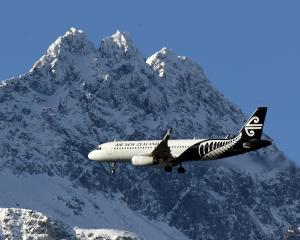John and Liz Rogers, who have volunteered for Wanaka's first marine emergency first response team, are no strangers to water.
Mr Rogers has "always had a dog and a boat" and the couple used to have a crib near Akaroa, which they used as a diving and boating base.
Mr Rogers (67), a former chief executive of Lichfield International and a Christchurch justice of the peace, and Mrs Rogers (59), a former IHC health promoter and registered nurse, moved from Christchurch to Wanaka five years ago.
Both had their boatmaster's and radio operator's certificates so they offered their services when Wanaka's marine search and rescue adviser Jim Talboys called for people to form Wanaka's marine emergency first response team.
The team is now on call 24 hours every day until the end of January and the rostered leader will be the first to be contacted by police if a water-based emergency occurs.
Three private boat owners and Simon and Danni Stewart's commercial outfit, Lakeland Adventures, are on the marine roster and up to 20 people have undergone a year-long training programme.
"It is something Coastguard units are doing throughout New Zealand and something we are interested in doing here in Wanaka.
"If we have an emergency on the lake, we need to know if we push a button we have crew available.
"It speeds up the process for the person requiring assistance," Mr Talboys, a Coastguard search and rescue controller, said this week.
The crews will be using new grid maps of Lake Wanaka developed this year specifically for search and rescue and not generally available to the public.
Each grid covers one nautical mile and is allocated a specific number.
The leader's job is to launch and get to the first corner of the grid as soon as possible and prepare their search plan.
"I will make a judgement about weather, visibility, water conditions and experience and skills of the boats with us," Mr Rogers said.
"Once I have prepared the plan, Liz takes it and runs the search while I concentrate on driving the boat, speed and keeping on course."
Armed with her trusty stopwatch, Mrs Rogers (59) must keep all boats in the grid search focused on the plan.
She will time each leg, announce when to start turning, time the sweep and announce the next leg.
As each grid is completed, she will radio the result back to the Wanaka police station.
"The reason for doing this is to make sure the search is absolutely thorough," she said.
This year, the team held four training SAR exercises at night to refine its systems.
"The deep night time ones make it about as difficult as you can get, with no light," Mr Rogers said.
The volunteers do not have radar - the small, cheaper models cost about $4000 each - and acquiring them is a future goal.
Each boat has GPS systems, radios and other specialised gear, and trained operators.
Helping people and saving lives is a cause close to the Rogers' hearts.
Mr Rogers is a former rescue diver - he no longer does it because of a lung problem - and had to call on all his resources to save his wife's life 12 years ago, after Mrs Rogers was attacked by a tiger shark while snorkelling in Fiji.
"Johnny saved my life.
"If he wasn't there, I wouldn't be here now," she said.
Mrs Rogers' left leg had to be amputated but the couple returned to Fiji to dive a year after the accident.
• There are three private boat owners on the Lake Wanaka marine SAR 24-hour roster.
Lakeland Adventures is also on call 24 hours.
Mr Talboys hopes to introduce a similar 24-hour roster for Lake Hawea marine Sar volunteers next year.










